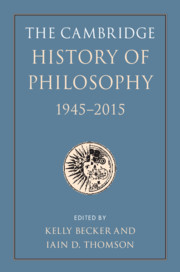Book contents
- The Cambridge History of Philosophy, 1945–2015
- The Cambridge History of Philosophy, 1945–2015
- Copyright page
- Contents
- Contributors
- Preface and Acknowledgments
- Introduction
- Part I Analytic Philosophy
- Part II Continental Philosophy
- Part III Bridge Builders, Border Crossers, Synthesizers, and Comparative Philosophy
- Section Eight Bridge Builders, Border Crossers, Synthesizers
- 42 Rethinking the Analytic/Continental Divide
- 43 Phenomenology and Ordinary Language Philosophy
- 44 Phenomenology Meets Philosophy of Mind and Language
- 45 The Impact of Pragmatism
- 46 Unruly Readers, Unruly Words
- 47 Anglo-American Existential Phenomenology
- 48 A Conceptual Genealogy of the Pittsburgh School
- Section Nine Comparative Philosophy
- Part IV Epilogue: On the Philosophy of the History of Philosophy
- References
- Index
47 - Anglo-American Existential Phenomenology
from Section Eight - Bridge Builders, Border Crossers, Synthesizers
Published online by Cambridge University Press: 08 November 2019
- The Cambridge History of Philosophy, 1945–2015
- The Cambridge History of Philosophy, 1945–2015
- Copyright page
- Contents
- Contributors
- Preface and Acknowledgments
- Introduction
- Part I Analytic Philosophy
- Part II Continental Philosophy
- Part III Bridge Builders, Border Crossers, Synthesizers, and Comparative Philosophy
- Section Eight Bridge Builders, Border Crossers, Synthesizers
- 42 Rethinking the Analytic/Continental Divide
- 43 Phenomenology and Ordinary Language Philosophy
- 44 Phenomenology Meets Philosophy of Mind and Language
- 45 The Impact of Pragmatism
- 46 Unruly Readers, Unruly Words
- 47 Anglo-American Existential Phenomenology
- 48 A Conceptual Genealogy of the Pittsburgh School
- Section Nine Comparative Philosophy
- Part IV Epilogue: On the Philosophy of the History of Philosophy
- References
- Index
Summary
A significant development in late twentieth-century philosophy was the fusion of pragmatist and analytic currents of thought in the Anglo-American tradition with existential approaches to phenomenology and philosophy in the European tradition. The foremost champion of this fusion was Hubert Dreyfus, although other prominent philosophers like Charles Taylor and Richard Rorty also have been influential in bringing existential phenomenology to bear on the analytic mainstream of philosophy in the English-speaking world. Dreyfus’s pragmatism-inflected and analytically friendly style of phenomenology draws freely on the work both of analytic philosophers like Wittgenstein, C. I. Lewis, Quine, and Davidson, as well as of Continental thinkers like Heidegger, Merleau-Ponty, Kierkegaard, and Foucault. Dreyfus was a pioneer in showing how phenomenology and existentialism are relevant to the concerns of contemporary analytic philosophy, but also in forging a distinctively Anglo-American style of existential phenomenology.
- Type
- Chapter
- Information
- The Cambridge History of Philosophy, 1945–2015 , pp. 646 - 663Publisher: Cambridge University PressPrint publication year: 2019
- 1
- Cited by



